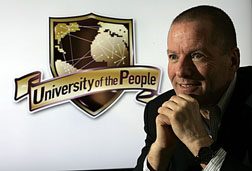Your own “AUDACITY OF HOPE”: It could be FREE or very cheap!
 With the high cost of a college or university education, I hope the education-vested interests won’t act like those in the oil industry who in various ways have held down, temporarily, the technology that’s supposed to liberate us from the energy crisis. The merger of the concepts of a cheap or free online university, iTunes University, the power of YouTube and smart cellphones, the Discovery Center, the Learning Annex, and the world wide web would be more difficult to push back. I think that the proper structuring and accreditation of an educational process that we now call online education will gain popularity and, hopefully, become cheaper. I don’t think those who charge an arm and a leg to provide online education could hold the dikes of expensive online courses much longer with the rather novel concept of a University of the People proposed by Shai Reshef, the Israeli entrepreneur behind the idea (see previous blog entry).
With the high cost of a college or university education, I hope the education-vested interests won’t act like those in the oil industry who in various ways have held down, temporarily, the technology that’s supposed to liberate us from the energy crisis. The merger of the concepts of a cheap or free online university, iTunes University, the power of YouTube and smart cellphones, the Discovery Center, the Learning Annex, and the world wide web would be more difficult to push back. I think that the proper structuring and accreditation of an educational process that we now call online education will gain popularity and, hopefully, become cheaper. I don’t think those who charge an arm and a leg to provide online education could hold the dikes of expensive online courses much longer with the rather novel concept of a University of the People proposed by Shai Reshef, the Israeli entrepreneur behind the idea (see previous blog entry).
Many skeptics? As usual for a rather new concept, especially one that threatens the pocketbooks of vested financial interests in higher education. But as the cost of obtaining an education becomes a huge family issue, especially in an economic downturn such as most of the world is experiencing, I hope that the pressure keeps up for government regulators and academics to come to grips with the realization of such an audacious concept as a cheap/free University of the People.
The University of the People already exists but with an inauspicious start. However, the New York Times quotes Mr. Reshef as saying, “We know that online peer-to-peer teaching works. Putting it all together, we can make a free university for students all over the world, anyone who speaks English and has an Internet connection.”
Your internet-connected PC and/or your smart cellphone have just shrunked the world and empowered you with an “audacity of hope”!
University of the People: LIBRE TI TUITION?
 Naipablaac toy sumaganad iti Los Angeles Times, March 9, 2009, maipanggep iti maysa nga Israeli entrepreneur ken ti panggepna a mangipatacder iti global virtual university a LIBRE ti tuition:
Naipablaac toy sumaganad iti Los Angeles Times, March 9, 2009, maipanggep iti maysa nga Israeli entrepreneur ken ti panggepna a mangipatacder iti global virtual university a LIBRE ti tuition:
Pasadena-based plan for online university draws interest, skepticism
Still, the University of the People, a Pasadena-based venture envisioned as the first global, online, peer-to-peer university, will be a real institution of higher education, its founder says.
“We’re unable to answer all these people,” Reshef said in a recent interview.
For now, the nonprofit university is sharing office space with Cramster, an online study community that Reshef also heads. It was through his work with Cramster that Reshef decided the peer-to-peer model might also work for online college classes.
“I learned how powerful social networking can be for learning,” he said.
A Tel Aviv resident who commutes monthly to his Pasadena office, Reshef said his latest venture involves using open-source technology, free course material from such universities as MIT and the lure of social networking to offer degrees to people who might not otherwise have access to them, for geographic or economic reasons.
Reshef has two decades of experience in international education. Starting in 1989, he served as chairman of Kidum, a for-profit educational services company in Israel. Later, he lived in the Netherlands and chaired KIT eLearning, the online partner of the University of Liverpool. He said this taught him how well online learning can simulate a traditional university setting, but also that it remained too expensive for many students.
Reshef said keeping the new university peer to peer will allow it to remain tuition-free. Classes won’t be headed by a professor; instead, students in each class will be given lecture material to discuss in online forums. Students will still have weekly assignments and quizzes and a final exam, much as they do in other online courses.
“The only difference is we don’t have the professor to monitor the discussion,” Reshef said.
Hofstra University law professor Daniel Greenwood, one of a handful of professors helping Reshef shape the curriculum and structure, equated the idea to an academic version of Wikipedia, with correct answers reached as a group.
To be admitted, students must have a high school diploma, access to the Internet and fluency in English. Instead of tuition, they would pay nominal fees for enrollment — from $15 to $50 — and exams — from $10 to $100 — with students from poorer countries paying the lower amounts.
Reshef anticipates opening in September with 300 students, to be admitted on a first-come, first-served basis. Initially, the university plans to offer only bachelor’s degrees in business administration and computer science. He expects to apply for accreditation as soon as possible, he said.
Once the university has 10,000 students, it will be self-sustaining, he said. Until then, it needs $5 million to get started, $1 million of which Reshef said he is putting up himself.
But the proposal has many skeptics.
Michael Lambert, executive director of the nonprofit Distance Education and Training Council, said others have tried the model of free education in the past and all have failed.
“If it’s free, can it be worth anything?” he asked. “If you can’t get a degree or credential out of it, what worth is it?”
John Bourne, executive director of the Sloan Consortium, a nonprofit group that works to integrate online learning into the higher education mainstream, called the proposed university’s chances of accreditation “slim to none.” He said accreditation is a thorough process that examines an institution in many areas, including its curriculum and faculty.
Bourne said he liked the Cramster model but found the idea of peer-to-peer teaching problematic. Although students at the new university could ask for assistance from professors through online forums, “students often don’t recognize when they need help,” he said.
They “don’t always get the nuances of the material,” he said. “You really need to have guides, even if they are on the side, who are knowledgeable about the course material.”
But Bourne said he and others in the education field have been intrigued by the proposed university.
“Everyone is interested in the idea, and everyone thinks there are problems,” he said.
 and don’t read or communicate in their ancestral tongue. We use Ilocano, as well, laced with some code-switching on occasion which of course exposes our inadequacies. We invite your comments and/or participation as guest bloggers here. We only ask for a modicum of conduct befitting a civilized exchange of ideas. –
and don’t read or communicate in their ancestral tongue. We use Ilocano, as well, laced with some code-switching on occasion which of course exposes our inadequacies. We invite your comments and/or participation as guest bloggers here. We only ask for a modicum of conduct befitting a civilized exchange of ideas. – 
